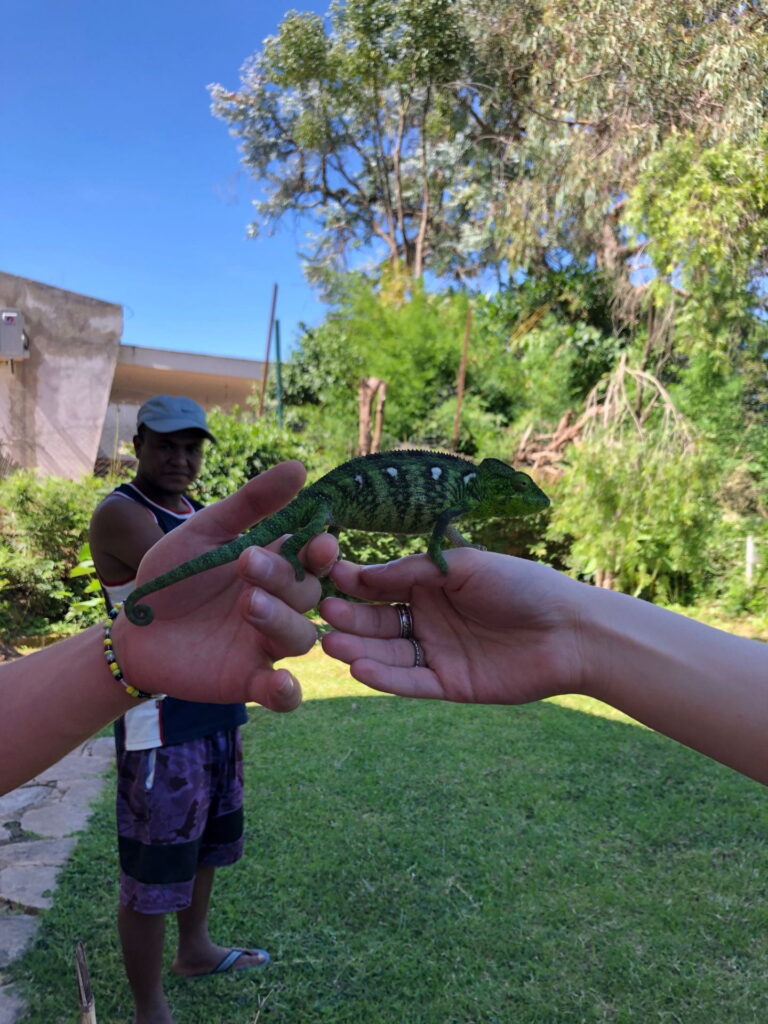Between classes, we go down to the river to search for chameleons. On a good day, we normally find one or two, plus or minus a couple lizards and maybe a frog if we’re lucky. But today must be something special. Maybe the chameleons can feel the oncoming cyclone, the slight drizzle in the air, the persistent wind stirring up the clouds so that every time I look up they’re in a different place. Today, we find a chameleon that’s yellow and green with a bright blue spine like a tiny stegosaurus. We spot another by the riverbank, completely brown like the dead branch it clings to. Three more lurk in the bushes near the ground. After picking them up and carrying them on our shoulders like the infamous pirates who helped settle the island, we let them go back into the rice fields that crowd around the river.

While this is only my second week of classes in Antananarivo, the capital city of Madagascar, I feel like I started learning the moment the plane touched down. Testing my high- school-textbook French against the rolling, accented speech of a fruit vendor at the market. Navigating the winding, chaotic bus system where people jump into the open door of a rickety van as it barely slows by the curb. Most of all, growing accustomed to my host family, learning where to hang up my laundry to dry and what to do with the potato and carrot skins after I peel them (we feed them to the tortoise in the garden out back).
As crowded and hectic as Tana can be, I’ve also experienced what the Malagasy call moramora, or living slowly. My host father spends hours sitting outside with his friends as the chickens peck haphazardly at the dirt around him, regaling them with tales from his job as a tour bus driver. My host mother makes sure I sit down and eat breakfast every morning with her while she has a cup of tea before I rush off to class. The two teenage girls living with us, who came hundreds of miles through the countryside looking for jobs, are always singing as they sweep the floors or swing open the windows in the morning. Though they don’t speak much French, I can muddle my way through a complete sentence in Malagasy by now, enough to make them both burst out laughing. I’ve gotten used to being laughed at, it means I’m learning.
As the deafening sound of rain against the metal roof heralds yet another afternoon thunderstorm, the tall, stone buildings of BC have never seemed farther away. My roommates back at 2K went sledding last weekend after a snowstorm hit Boston. The BC Symphony Orchestra is preparing for a concert next week, the first one I’ll miss since my freshman year. The church bells across the river don’t ring out the short, orderly Westminster chime of Gasson Hall; they clamor and clash in a tuneless wave of sound that floods the city. But just when I feel like I’m missing out on one of my few remaining semesters to be on-campus and in-person, one of the guards at our program center calls out tanalahy! chameleon! and all five of us students go running outside barefoot as if this was the first time we’ve ever seen such a creature, and I know I made the right decision in coming here.
Now, the program center is buzzing with talk about our upcoming independent research projects. With a continent-sized island and hundreds of endemic species to choose from, the possibilities truly seem endless. One classmate will survey orchid growth over an altitude gradient in a northern rainforest. Another wants to inventory leaf-tailed geckos on a remote island off the east coast. As for me, I still have time to decide what I want to focus on before we leave for the field in two months. But in the meantime, I’ll go down to the river for inspiration, to watch the birds pick through the rice fields, and for a friendly game of chameleon counting.